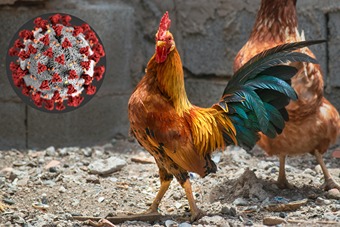Background
Avian influenza, commonly known as bird flu, is a highly contagious viral infection that primarily affects birds. There are two types of bird flu viruses: Highly Pathogenic Avian Influenza (HPAI) and Low Pathogenic Avian Influenza (LPAI). HPAI causes severe symptoms and can lead to sudden death in birds, especially domestic poultry, while LPAI usually causes mild symptoms or no symptoms at all.
How Bird Flu Spreads
Bird flu is mostly spread through wild birds, which are the natural hosts of the virus. These birds can carry the virus without showing any symptoms. The virus is shed in their saliva, nasal secretions, and droppings. When domestic birds, like chickens and turkeys, come into contact with these secretions, they can get infected. This can happen through direct contact with infected wild birds or through contaminated water and food.
Humans can rarely get infected with bird flu. The main way this happens is through close contact with infected birds or their droppings. For example, people working on poultry farms are at higher risk.
Symptoms of Bird Flu
In birds, symptoms of bird flu can include:
- Sudden death
- Breathing difficulties
- Coughing and sneezing
- Swelling of the head
- Purple discoloration of the comb and wattles
- Decreased egg production
- Diarrhoea
- Nervous system issues like uncoordinated movements
In humans, bird flu symptoms can resemble regular flu and include:
- Fever
- Cough
- Sore throat
- Muscle aches
- Headaches
- Shortness of breath
- Sometimes, more severe illnesses like pneumonia
What to Do and Not to Do
Do:
- Be vigilant if you own birds and watch for any signs of illness.
- Report any suspected cases of bird flu to local authorities immediately.
- Practice good hygiene, like washing your hands after handling birds or their eggs.
- Cook poultry and eggs thoroughly before eating.
Do Not:
- Do not handle sick or dead birds without protection.
- Avoid contact with bird droppings.
- Do not eat undercooked poultry or eggs.
Treatment
For humans, bird flu is usually treated with antiviral medications that are effective against influenza. These can help reduce the severity of the illness if taken early. It’s also important to isolate infected individuals to prevent the spread of the virus.
In birds, the primary method of controlling an outbreak is to cull infected and exposed birds. This helps prevent the virus from spreading further.
Interesting Facts
- Bird flu viruses are named based on two proteins found on their surface: haemagglutinin (H) and neuraminidase (N). For example, H5N1 is a common subtype that has caused severe outbreaks.
- Some wild bird species can carry the bird flu virus without getting sick, acting as silent carriers.
- Despite its name, you cannot catch bird flu from eating fully cooked poultry or eggs.
- There have been nine outbreaks of Highly Pathogenic Avian Influenza in Australia since 1976, all of which were quickly contained and eradicated.
Conclusion
Avian influenza is a serious disease that primarily affects birds but can occasionally spread to humans. Understanding how it spreads, recognizing the symptoms, and knowing what to do can help prevent and control outbreaks. Always practice good hygiene and report any suspected cases to keep both birds and humans safe.
Similar Articles :
- Bird Flu (Avian Influenza): Symptoms, Transmission, and Prevention
- What Are the Challenges in Controlling Bird Flu?
- Why Is Global Collaboration Crucial in Managing Bird Flu?
- How Did Bird Flu Become a Threat to Humans?
- What Are the Challenges in Controlling Bird Flu?
- How Does Bird Flu Affect Bird Populations?
FAQs About Avian Influenza (Bird Flu)
What is avian influenza?
Avian influenza, or bird flu, is a highly contagious viral infection that primarily affects birds but can occasionally infect humans.
Symptoms of bird flu in humans
Bird flu symptoms in humans include fever, cough, sore throat, muscle aches, headache, shortness of breath, and sometimes pneumonia.
How does bird flu spread to humans?
Bird flu spreads to humans through close contact with infected birds, their droppings, or contaminated environments.
Can bird flu kill humans?
Yes, certain strains of bird flu, such as H5N1, can be fatal to humans.
Is bird flu dangerous to humans?
Yes, bird flu can be dangerous to humans, causing severe respiratory illness and, in some cases, death.
Prevention and control of avian influenza in poultry
Prevention and control in poultry involve strict biosecurity measures, vaccination (where available), and culling infected or exposed birds.
How to prevent bird flu in humans
Prevent bird flu in humans by avoiding contact with infected birds, practicing good hygiene, and thoroughly cooking poultry and eggs.
Current avian flu map
For the latest information on avian flu outbreaks, refer to official health and agriculture websites for current maps and updates.

